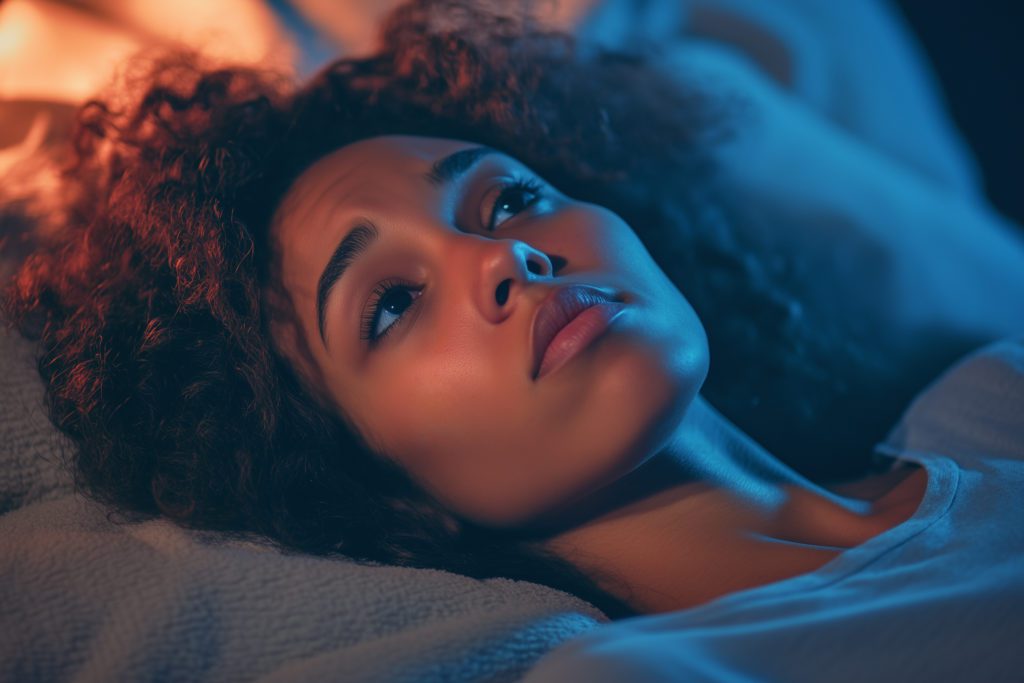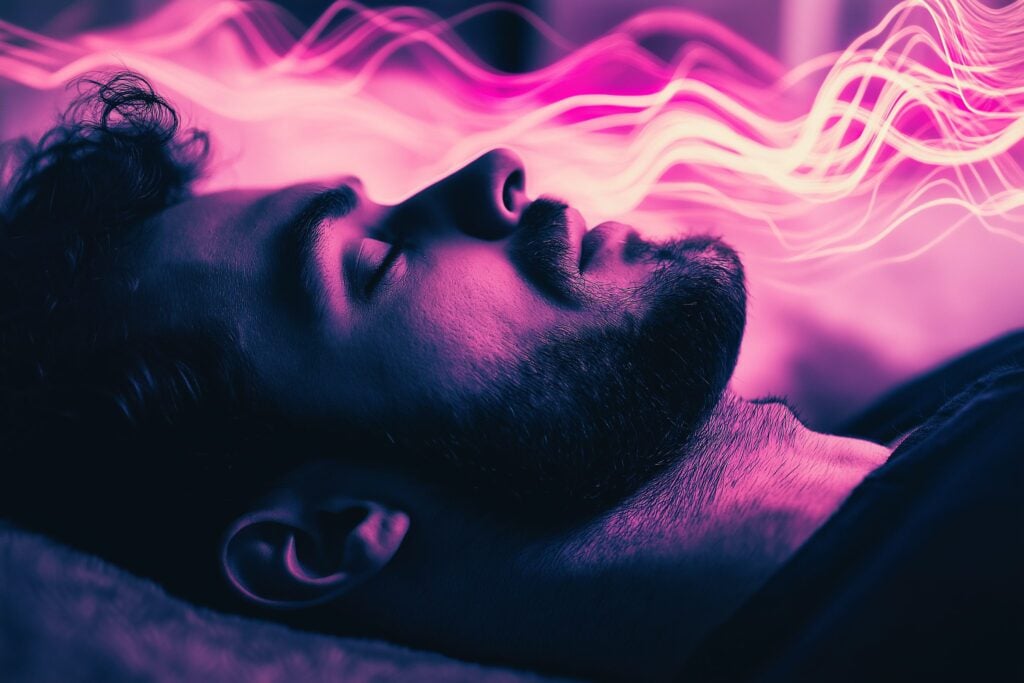
Why Can’t I Sleep Even Though I’m Tired? Overcoming Sleepless Nights
If you feel tired but can’t sleep at night, it could be due to depression, anxiety, medications, poor sleep hygiene, hormonal changes, nicotine, or pain. Learn what you can do when you can’t fall asleep.

You’ve felt tired all day and would like nothing more than to fall asleep, but you can’t. Instead, you find yourself lying in bed staring at the ceiling. Everything is quiet. The room is dark. So, why can’t you sleep? When you are utterly exhausted but unable to sleep, it’s called insomnia. This is one of the most common sleep problems. Some of the symptoms of insomnia include:
- Difficulty falling asleep
- Feeling tired during the day
- Trouble staying asleep through the night
- Having a hard time concentrating
- Daytime fatigue
Reasons Why You Can’t Sleep
Here are some of the most common reasons why you may not be able to sleep — even though you are dead tired. Go through the list and see if any of these factors could play a role.
Depression
Sleep disturbance is one of the most common features of depression. Up to 90 percent of people diagnosed with depression have problems with sleep quality. If you have depression, you may feel tired and fatigued yet be unable to sleep. The symptoms of depression include:
- Sad, low, or irritable mood
- Difficulty concentrating
- Loss of interest in normal activities
- Fatigue or low energy levels
- Poor sleep
- Recurrent thoughts of death or suicide
If you have difficulty sleeping and you also have symptoms of depression, it’s important to seek help from a mental health professional. Treating depression will often make sleep problems disappear.
Disrupted Sleep-Wake Cycle
Your circadian rhythm or internal clock runs on a 24-hour cycle. It helps control your body’s sleep-wake cycle. Your internal clock can be thrown off by many things, including working irregular or night shifts. People who work irregular shifts may feel extremely fatigued but be unable to sleep because the shift work has caused disruptions to their circadian rhythm. Other causes of a disrupted sleep-wake cycle include an irregular sleep schedule, jet lag, and medical and psychiatric illnesses.
Anxiety
Sleep disturbances are very common in anxiety disorders. It can be very hard to fall asleep if your mind is racing with worry and you are feeling tense. Anxiety causes the release of cortisol, the stress hormone, which makes it harder to fall asleep. If you have an anxiety disorder, you may:
- Feel nervous or on edge
- Feel tired or weak
- Experience difficulties falling or staying asleep
- Have trouble concentrating
- Experience shaking or trembling
- Have difficulty controlling worry
If you are tired, but anxiety is causing you to not be able to sleep, practicing relaxation exercises before bed may help. You might try to visualize a calm place. Think of a relaxing place, and imagine it in great detail. Imagine both the sights and the sounds. This practice should relax you enough so that you can fall asleep.
Poor Sleep Hygiene
Sleep hygiene refers to the things that you do right before bed that impact your sleep. Good sleep hygiene helps you sleep better. However, if you have poor sleep hygiene, it can prevent you from falling asleep, even though you are tired. Some of the most common examples of poor sleep hygiene that you’ll want to avoid include:
- Taking long daytime naps or napping late in the day
- Drinking caffeinated coffee or tea close to bed (8 hours before bedtime)
- Not having a regular sleep schedule
- Engaging in strenuous exercise close to bedtime
- Eating heavy meals right before bedtime
- Not having a quiet, comfortable place to sleep
Hormonal Changes
Fluctuating hormonal levels can wreak havoc on your sleep. Hormonal changes can cause body temperature changes and night sweats, both of which can interfere with sleep. Changes in hormones may be caused by:
- Your period
- Pregnancy
- Peri-menopause and menopause
If you are experiencing any of the above hormonal changes, and you find that you can’t sleep, talk to your doctor or OB/GYN. They may recommend certain medications or other treatments to help with these hormonal changes. This can help you sleep better.
Pain
Pain and sleeping problems go hand-in-hand. Chronic or acute pain from arthritis, fibromyalgia, injuries, or nerve damage can make it hard to fall asleep — even if you are extremely fatigued. You may find it challenging to find a sleeping position that doesn’t trigger your pain. Pain can also cause you to wake up frequently during the night. It can be hard to go back to sleep once you wake up in pain. Besides medications, relaxation exercises before bedtime can help reduce pain so that you can fall asleep more easily.
Smoking or Vaping
Sleep experts note that people who smoke or vape nicotine often have difficulty falling asleep. That is because nicotine, the active ingredient in cigarettes and vapes, is a stimulant. Not only does smoking or vaping make it difficult to fall asleep, but using nicotine can also result in poorer quality sleep overall. Quitting is worth it in the long run for both your sleep and general health. Just be aware that sleep issues will continue during the initial withdrawal period.
Medications
Do you regularly take medications? There are a variety of prescription and over-the-counter medications that can interfere with sleep. The medications most commonly associated with insomnia include:
- Decongestants: Pseudoephedrine (Sudafed)
- Pain Relievers: Acetaminophen With Aspirin and Caffeine (Excedrin)
- Beta-blockers: Propranolol (Inderal)
- Steroids: Prednisone (Deltasone)
- ADHD Medications: Methylphenidate (Ritalin)
- Pain Medications: Tramadol (Ultram), Hydrocodone (Norco)
- Depression and Anxiety Medications: Citalopram (Celexa), Fluoxetine (Prozac)
- Alpha Blockers (Prostate): Tamsulosin (Flomax)
- Asthma Medications: Albuterol (Ventolin HFA and ProAir)
If you are taking any of the above medications and are having trouble falling or staying asleep, then you should talk to your doctor.
What Should You Do if You Can’t Fall Asleep?
If you have been lying in bed for 25 minutes and you can’t sleep, get up and do a mindful activity. You can try:
- Bedtime meditation
- A relaxing yoga practice
- Journaling
- Reading a book
- Listening to soothing sounds (Download Pillow to listen)
- Drinking non-caffeinated chamomile tea
Do the activity as long as you feel awake. When you feel sleepy, return to bed. If you’ve tried the above techniques without success, schedule an appointment with your doctor or a sleep specialist.
FAQ
What are common reasons for feeling tired but unable to sleep?
A variety of factors can contribute to feeling exhausted yet unable to fall asleep. These may include emotional issues like depression and anxiety, which can create a mental state that hinders relaxation. Environmental and lifestyle factors—such as poor sleep hygiene, exposure to bright screens before bed, or irregular sleep schedules can also disrupt natural sleep patterns. Additionally, physiological factors like hormonal imbalances, chronic pain, use of stimulants like nicotine, and certain medications can affect the ability to fall asleep.
How does anxiety impact sleep, and what can be done to manage it?
Anxiety often causes the mind to race, creating tension and increasing cortisol (the stress hormone), both of which hinder relaxation and make falling asleep difficult. Techniques such as deep breathing exercises, progressive muscle relaxation, or meditation can help to reduce anxiety before bed. Cognitive Behavioral Therapy for Insomnia (CBT-I) is also effective in managing anxiety-related sleep issues by addressing thought patterns that interfere with rest.
What role does circadian rhythm play in sleep, and how can disruptions affect rest?
Your body’s circadian rhythm regulates sleep-wake cycles. Disruptions from irregular schedules or jet lag can cause sleep difficulties, even when you’re tired. Keeping a consistent schedule and light exposure helps realign this rhythm.
How can poor sleep hygiene contribute to insomnia, and what changes can improve it?
Poor habits like screen time, caffeine, or late meals disrupt sleep. Improving sleep hygiene with a regular schedule, a calming routine, and a cool, dark room can boost sleep quality.
Can certain medications cause sleeplessness?
Yes, some medications, like decongestants, steroids, and beta-blockers, may cause insomnia. Consult your provider for alternatives if needed.
What strategies can help when you can’t fall asleep?
Try mindfulness techniques like meditation, journaling, white noise, or herbal tea (chamomile or valerian) to create a calming pre-sleep environment.
How do hormonal changes affect sleep?
Hormonal changes, like those during menstruation, pregnancy, and menopause, can disrupt sleep. Managing sleep hygiene and using cooling techniques can help.
Why might pain interfere with sleep, and what strategies can help?
Pain makes it tough to get comfortable and stay asleep. Supportive pillows, a quality mattress, and gentle stretching may help, along with consulting a provider if pain persists.
What lifestyle changes can improve sleep quality?
Consistent routines, limiting caffeine and alcohol, and regular physical activity can improve sleep. A calming bedtime routine also cues the body to relax.

Written by
Emily Mendez
Emily Mendez is a former therapist and mental health author. She is one of the leading voices in mental health. Emily's writing has appeared in eCounseling, SonderMind, and more. Emily is frequently interviewed by Healthline, Fatherly, INSIDER, Family Circle, and other national media for her advice and expert opinion on the latest mental health topics.
Download Pillow
Get help
Press & News
Legal
Connect
X (Twitter)
Company
Copyright © Neybox Digital Ltd.



